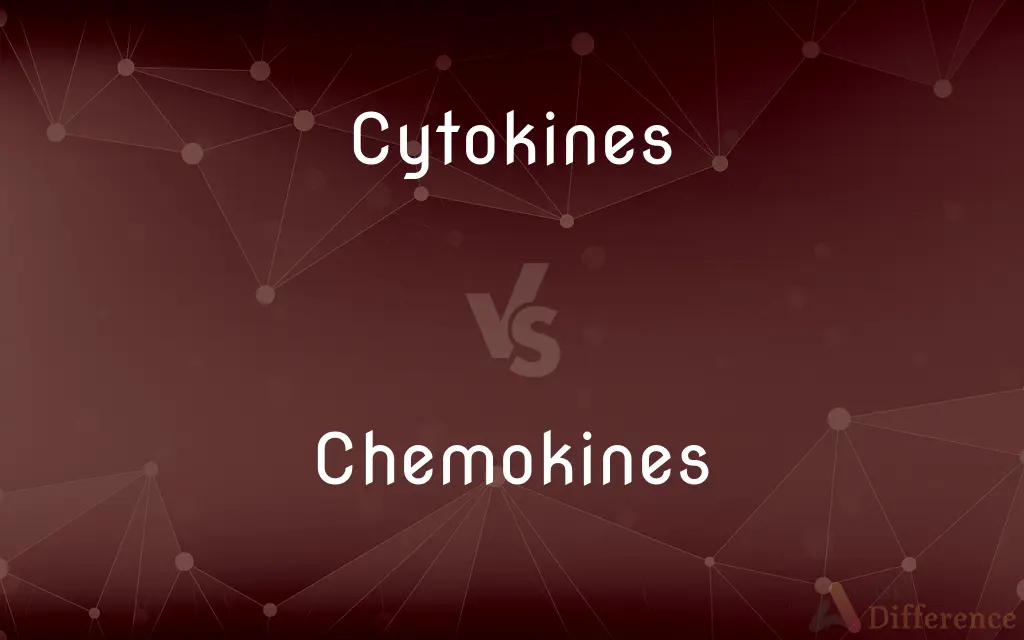Cytokines vs. Chemokines — What's the Difference?
By Tayyaba Rehman — Published on November 1, 2023
Cytokines are broad-ranging cell signaling proteins, while Chemokines are a subset of cytokines specifically guiding white blood cell movement.

Difference Between Cytokines and Chemokines
Table of Contents
ADVERTISEMENT
Key Differences
Cytokines and Chemokines are both pivotal molecules in the realm of immunology and cell communication. Cytokines is an umbrella term that encompasses a diverse group of proteins, peptides, or glycoproteins. These molecules are secreted by specific cells in the immune system and play a significant role in mediating and regulating immune responses, inflammation, and hematopoiesis, the formation of blood cellular components.
Chemokines, on the other hand, are a specialized subset of Cytokines. Their primary function is to induce directed chemotaxis in nearby responsive cells, which means they essentially guide the migration of cells. Specifically, Chemokines are responsible for directing the movement of white blood cells to sites of infection or injury. Thus, their name: "chemo-" indicating movement and "-kines" from kinetics.
While all Chemokines are Cytokines, not all Cytokines are Chemokines. The broader category of Cytokines includes other molecules like interferons, interleukins, and tumor necrosis factors, to name a few. These play diverse roles in the body from defending against viruses to mediating inflammation.
Chemokines, given their specialized function, are critical in conditions where white blood cells need to be recruited, such as in inflammatory diseases, wounds, and infections. Their primary role is to ensure that immune cells are present at the site where they are most needed.
In essence, Cytokines and Chemokines are messengers of the cell world. Cytokines cover a broad spectrum of cell communication, whereas Chemokines have a specialized role in guiding cell movement, particularly in immune responses.
ADVERTISEMENT
Comparison Chart
Definition
Broad cell signaling proteins.
A subset of cytokines directing cell movement.
Function
Regulate immune responses, inflammation, and hematopoiesis.
Guide white blood cells to infection or injury sites.
Types Included
Interleukins, interferons, growth factors, etc.
CCL, CXCL, etc.
Role in Immune Response
Mediate and regulate immune reactions.
Direct white blood cell movement.
Relationship
Encompasses a variety of cell signaling molecules.
Is a specific type of cytokine.
Compare with Definitions
Cytokines
Proteins crucial for cell signaling in immune responses.
Cytokines are pivotal in mediating inflammatory reactions.
Chemokines
Proteins guiding white blood cell movement.
Chemokines help recruit immune cells to infection sites.
Cytokines
Regulators of host responses to infection or trauma.
High levels of Cytokines can lead to severe inflammation.
Chemokines
Molecules inducing directed chemotaxis in cells.
The presence of Chemokines ensures timely immune responses.
Cytokines
Molecules aiding in communication between cells.
Upon infection, certain cells release Cytokines to alert the immune system.
Chemokines
Agents responsible for immune cell migration.
During inflammation, Chemokines direct white blood cells to the inflamed tissue.
Cytokines
Messengers that facilitate intercellular communication.
In autoimmune diseases, Cytokines can sometimes send incorrect signals.
Chemokines
Specialized cytokines focusing on cell movement.
Chemokines ensure that our body's defenses are in the right place at the right time.
Cytokines
Modulators of cell growth and differentiation.
Cytokines play a role in how cells develop and differentiate.
Chemokines
Immune system's navigation system for cells.
Thanks to Chemokines, immune cells swiftly reach wounded areas.
Cytokines
Any of various proteins, such as the interleukins and lymphokines, that are released by cells of the immune system and act in intercellular communication, especially in regulating inflammation and the immune response.
Chemokines
Any of various chemotactic cytokines that are released by several cell types and act to attract monocytes, neutrophils, and other white blood cells to sites of injury or inflammation.
Cytokines
Plural of cytokine
Chemokines
Plural of chemokine
Common Curiosities
What are Cytokines primarily responsible for?
Cytokines are primarily responsible for cell signaling, especially in immune responses.
What are chemokines?
Chemokines are a class of small proteins that play a vital role in guiding immune cells to specific locations in the body, such as sites of infection or inflammation.
Are all Chemokines also Cytokines?
Yes, all Chemokines are a subset of Cytokines.
What cells produce Cytokines?
Many cells, including immune cells like macrophages, produce Cytokines.
What is the role of interleukins among cytokines?
Interleukins are cytokines that mediate communication between leukocytes (white blood cells) and are critical for immune responses.
What makes Chemokines distinct from other Cytokines?
Chemokines specifically guide the movement of white blood cells.
What are cytokines?
Cytokines are small proteins or peptides that play a crucial role in cell signaling and communication in the immune system and other biological processes.
What are the receptor proteins for chemokines called?
Chemokine receptors are cell surface proteins that bind to chemokines, allowing immune cells to respond to chemokine signals and migrate accordingly.
Share Your Discovery

Previous Comparison
Formal Organizations vs. Informal Organizations
Next Comparison
Section vs. Cross SectionAuthor Spotlight
Written by
Tayyaba RehmanTayyaba Rehman is a distinguished writer, currently serving as a primary contributor to askdifference.com. As a researcher in semantics and etymology, Tayyaba's passion for the complexity of languages and their distinctions has found a perfect home on the platform. Tayyaba delves into the intricacies of language, distinguishing between commonly confused words and phrases, thereby providing clarity for readers worldwide.












































